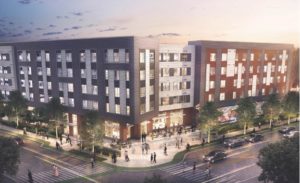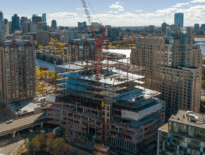
Developers predict rising mortgage rates will translate into increased demand for apartment rentals in Greater Boston, such as Greystar’s 450-unit apartment complex at 35 Garvey St. in Everett. But some are scaling back their long-term development pipelines as double-digit increases in project costs threaten profitability. Image courtesy of Greystar
Rising mortgage rates are pushing home ownership out of reach for many first-time homebuyers in Greater Boston who are already writing bigger rent checks, just as a decade-long boom in apartment construction appears to be losing momentum.
Developers are delaying or shelving some projects that no longer appear to meet their financial targets amid double-digit project cost escalation, from rising material and labor costs to higher interest rates on construction loans.
Multifamily developer Greystar – which recently completed the 212 Stuart St. luxury tower in Boston and has three projects totaling more than 1,900 apartments under construction in Everett – has walked away from several early-stage projects in the Route 128 and Interstate 495 suburbs since Labor Day, said Gary Kerr, Greystar’s managing director of U.S. East development.
Hard costs such as materials and labor have increased close to 20 percent this year, Kerr said.
“We still have project cost escalation and the cost of debt is up, so the ultimate value of the asset is decreasing,” he said. “It makes these projects pretty non-viable.”
Homebuyers’ ‘Paralyzing’ Sticker Shock
The “renters-by-necessity” segment of the apartment market has expanded amid the steep increase in mortgage rates, developers say, supporting recently completed projects.
Michael Procopio, CEO of Middleton-based multifamily developer Procopio Cos., predicts rising demand for apartments in Boston suburbs.
“Six months ago, people could afford an $800,000 house and today they can only afford $400,000 because of interest rates, and that’s impactful,” Procopio said. “These people are becoming renters of the high-end projects.”
Rising mortgage rates have pushed home ownership out of reach for many renters, adding to competition for apartment units even as the rental property construction pipeline declines. In late October, the average 30-year fixed-rate mortgage topped 7 percent for the first time since 2002, according to Freddie Mac.
“We’ve got generations of buyers who have seen nothing but sub-3.5 percent mortgage rates for a decade, and all of a sudden the sticker shock is paralyzing,” said Sue Hawkes, managing director of The Collaborative Cos. in Boston.
For now, Procopio said higher development costs have been offset by rising rents and Greater Boston’s economic resilience. Rents at Procopio Cos.’ Sedna apartments in Beverly approach $4 per square foot, equivalent to luxury properties in Boston’s Seaport District just a few years ago, but both equity investors and debt lenders are tightening their underwriting on future projects.
“There’s a number of deals that are not happening because of the capital markets,” Procopio said.
Boston Developers Face Worse Fundamentals
Developers in the city of Boston have additional financial burdens in higher union labor costs and steady increases in the percentage of income-restricted units required by the Boston Planning & Development Agency. Affordable unit percentages have ranged as high as 25 percent in recent approvals such as the Enterprise Research Campus in Allston by Harvard University and Tishman Speyer.
And a committee appointed by Mayor Michelle Wu is continuing to study implementation of a rent stabilization ordinance, one of Wu’s campaign platforms, which could deter investment in new projects.
“There are going to be tertiary markets that are going to be beneficiaries of developers moving out of Boston for the time being: places like Revere and Quincy,” Hawkes said.
One such developer is Oleg Uritsky, CEO of Helge Capital, which broke ground Oct. 31 on the 114-unit SORA Revere complex at 93 Bennington St. The project, a joint venture with Gansett Ventures, received $42.5 million in construction financing from Needham Bank.
Uritsky estimated project costs have increased 8 percent in the past year, but will be offset by rising mortgage rates that generate rising demand for apartments and higher rents.
Still, Uritsky said, developers are taking a harder look at future projects’ feasibility amid the volatile economic climate and delaying groundbreakings, while deciding whether to sell the project.
“It takes more time to close, and people say, `Maybe I’m going to sit on it and put it on the market in a year or two,’” he said.
New Supply Could Moderate Rents
Rents have fully recovered from the 2020-2021 pandemic dip in urban Boston, according to multiple industry reports which rank Greater Boston as the nation’s second-priciest rental market after New York City.
And Greater Boston’s 15 percent rent increase since March 2020 is the nation’s second-highest after Los Angeles, according to a report released last week by Apartment List.
“Boston fits into the category of expensive coastal metros where rents declined sharply and bounced back pretty quickly, making up all of that lost ground,” Apartment List Senior Housing Economist Chris Salviati said.
Luxury apartment rents rose 8 percent in the past 12 months, according to a Collaborative Cos. report that encompasses large rental properties in core Boston neighborhoods including Allston-Brighton and East Boston, along with Brookline, Cambridge and Somerville.
Asking rents in the urban core averaged $4.66 per square foot in the third quarter of 2022, 5 percent higher than pre-pandemic levels, according to the report.
Beyond the large professionally-managed complexes, Boston’s small landlord market appears to be reaping rent gains as well.

Steve Adams
Boston Pads, an online service that tracks more than 200,000 apartment listings in Greater Boston, says asking rents averaged over $2,800 per month across the region.
“We still have an insatiable housing demand and we’ve never really addressed the issue,” Boston Pads CEO Demetrios Salpoglou said. “The elephant in the room is the supply issue, not the demand issue.”
While continuing to rise, rents have shown some recent signs of moderation, according to a report released this week by Colliers International. After rising 18 percent in the past six quarters to a record of nearly $3 per square foot, asking rents across Greater Boston were essentially unchanged in the third quarter.
“Many landlords are now trying to balance tenants’ ability to pay higher rents against the impact of inflation on household budget and to prevent tenant relocations into the many new complexes coming on-line,” Colliers Boston Research Director Jeffrey Myers wrote in the report.




 |
| 
